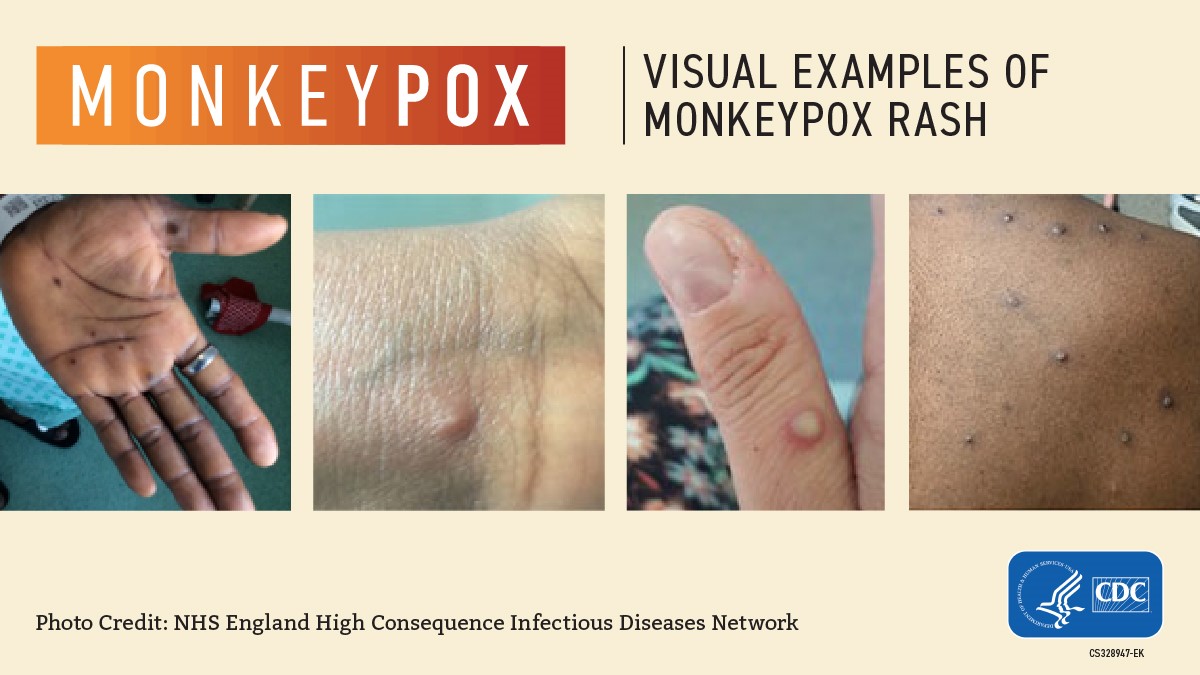While the 2022 Mpox outbreak has been declared over and the declared public health emergency has ended, low-level transmission of mpox is still occurring in the U.S.
Mpox transmission may still occur within South Carolina.
Providers should continue to test patients with clinical symptoms suggestive of mpox and offer or recommend mpox vaccination as part of routine STD care.
In addition, DHEC strongly recommends that people receive both doses of the mpox vaccination prior to activities that could lead to high-risk contact. There is some protection after the first dose, but the best protection occurs two weeks after the second dose. Jynneos vaccine continues to be made available through DHEC and selected provider clinics that routinely provide STD and HIV clinical services to those most at risk of exposure. You may search for options near you on the mpox vaccine provider map.
Educational Materials
The public, community partners, healthcare providers and others can share these materials to help increase awareness of and reduce exposure to mpox in South Carolina.

What Everyone Needs to Know
These materials provide information about what mpox is, its symptoms, and what you can do.

What Those At Higher Risk Need to Know
These materials are for those at higher risk of exposure to mpox. They provide information about what mpox is, its symptoms and what you can do now and after getting a vaccination.

A Clinician's Guide
This fact sheet is for healthcare providers and contains information about how Mpox presents, testing, treatment, and reporting cases to DHEC.
What You Need to Know About Mpox
Key Information for Clinical Providers
- If you suspect mpox in a patient, after your evaluation please report it to your DHEC regional epidemiology team. DHEC may initiate contact tracing pending laboratory results for highly probably cases and provide additional guidance.
- Testing for mpox is available through commercial laboratories or the Public Health Laboratory. PHL testing requires pre-approval but has faster turnaround time. See HAN: Updated Guidance for Monkeypox Virus (MPOV) Evaluation (7-06-2022).
- For individuals with severe cases of mpox, DHEC has pre-positioned TPOXX antiviral treatment across the state. Please consult the DHEC Medical Consultant covering your region to obtain TPOXX for a patient. Do not call CDC directly.
Lowcountry
Allendale, Bamberg, Beaufort,Berkeley, Calhoun, Charleston,
Colleton, Dorchester, Hampton,
Jasper, Orangeburg
4050 Bridge View Drive, Suite 600
N. Charleston, SC 29405
Office: (843) 441-1091
Fax: (843) 953-0051
Nights/Weekends: (843) 441-1091
Midlands
Aiken, Barnwell, Chester,Edgefield, Fairfield, Lancaster,
Lexington, Kershaw, Newberry,
Richland, Saluda, York
2000 Hampton Street
Columbia, SC 29204
Office: (888) 801-1046
Fax: (803) 576-2993
Nights/Weekends: (888) 801-1046
Pee Dee
Clarendon, Chesterfield,Darlington, Dillon, Florence,
Georgetown, Horry, Lee, Marion,
Marlboro, Sumter, Williamsburg
1931 Industrial Park Road
Conway, SC 29526
Office: (843) 915-8886
Fax: (843) 915-6506
Nights/Weekends: (843) 409-0695
Upstate
Abbeville, Anderson, Cherokee,Greenville, Greenwood, Laurens,
McCormick, Oconee, Pickens,
Spartanburg, Union
352 Halton Road
Greenville, SC 29607
Office: (864) 372-3133
Fax: (864) 282-4373
Nights/Weekends: (864) 423-6648
- See previously released HANs:
- Update for Clinicians on Monkeypox (MPX) in People with HIV, Children and Adolescents, and People who are Pregnant or Breastfeeding (8-01-2022)
- Updated Guidance for the Evaluation and Treatment of Monkeypox (MPX) (7-29-2022)
- Update for Clinicians on Testing and Treatment of Monkeypox (7-29-2022)
- Updated Guidance for Monkeypox Virus (MPXV) Evaluation (7-06-2022)
- Updated Case-finding Guidance: Monkeypox Outbreak—United States, 2022 (6-15-2022)
- Monkeypox Virus Infection in the United States and Other Non-endemic Countries—2022 (5-20-2022)
